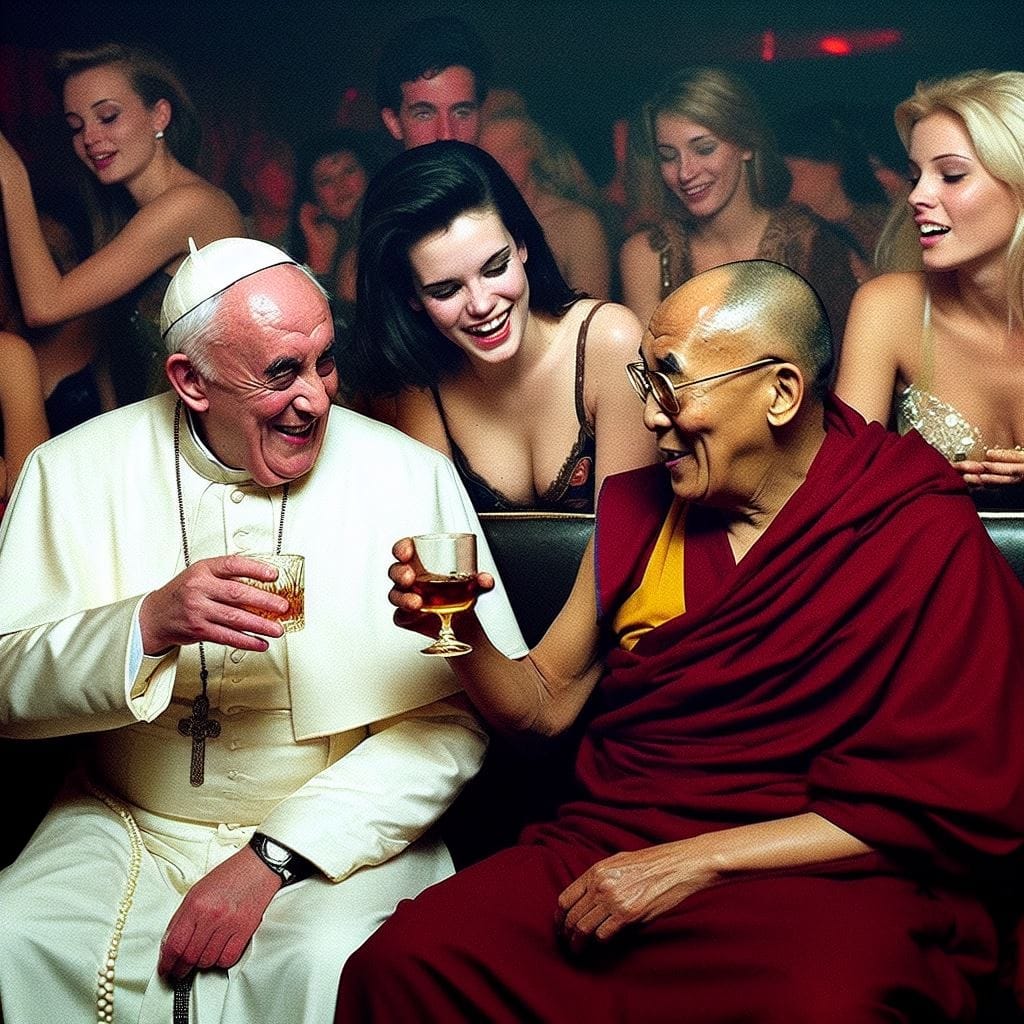I’ve been thinking that Substack lends itself nicely to a kind of promiscuous sharing of writers I like with my audience and sharing my audience (who I like very much) with other writers.
DANIEL PINCHBECK is someone I follow on this platform. He joined me on my podcast years ago (episode 244). I find his writing to be stylish, fluent, and honest, and his thinking is astute and well-informed. I don’t always agree with him (or anyone else), but I enjoy his take on modernity — maybe because he doesn’t really have “a take.” Unlike so many other “public intellectuals,” there is a humility to Daniel, who seems to be continually learning, reconsidering, digging deeper, abandoning previous passions. He doesn’t pretend to have it all figured out, but invites readers to come along for the journey of discovery. I admire that in a writer.
I hope you enjoy Daniel’s recent musings on some of the challenges we face, and if you do, I encourage you to slide over to his newsletter and check out some of his other material.
CPR
1. Predicament
Today my mind pulsates with inchoate feelings and incomplete thoughts. Ripples, echoes, fragments. Atonal chords. Information shards. Discordant frequencies.
How do you feel? Somewhat similar, perhaps?
One friend insists that Putin is responsible for the ongoing splintering of America. Russian spooks mastered the dark arts of disinformation and spin control. Their meme hackers send us spiraling into ever-deeper incoherence and confusion.
I tend to believe America is disintegrating from rot and corruption that spread from within (financialization of the economy; wealth concentrating in fewer and fewer hands; public education and civic life deteriorating), first of all. But Putin is delighted to accelerate our downward slide.
Another friend is still convinced that Covid vaccines are destructive bioweapons—in fact, he believes all vaccines are bad, deteriorating bodily sovereignty. But the Covid vaccines, in particular, were unleashed with malevolent intent by the utterly evil pharmaceutical/WEF technocratic cabal. This cabal wants to permanently compromise the immune system of the “sheeple,” further controlling and perhaps eventually (as resources run out) mass-slaughtering us with the next “gain of function” roll-out. By not getting this, I must be one of the sheeple, or perhaps an agent of the elite. I need to spend many hours watching long videos of Whitney Webb and Sasha Latypova, reading all of their analysis, despite hitting Paywalls and not having the many hours available for such turgid deep dives.
I try to read Latypova and immediately encounter this, which seems deeply paranoiac to me:
Overall characterization of what is going on: the federal and most of the state governments are gone and captured. Whatever is running the federal gov agencies (e.g. HHS) really intends to kill you, or at least substantially injure you, damage your reproductive capacity and repossess your assets in the process. The aim is to reduce the population and terrorize the survivors enough to establish a totalitarian control over much of the world’s territory. Nobody is coming to save you, your survival and that of your children is in your hands only.
I simply do not believe this—but I am happy to be convinced otherwise.
Some readers are furious at me for not utterly condemning Israel as some ultimate evil, instead of granting them some slack after six million dead in the Holocaust, the nightmare of dealing with Islamic fanaticism and terrorism, and the survival imperative of an imperiled ethnic/religious minority almost universally despised. Others are equally mad that I believe the Israeli military has committed far too much wanton slaughter, and needs to pull back.
Ever hopeful, I start to read the ecological anarchist Dougald Hine’s new book, At Work in the Ruins. He focuses on his disagreements with Breaking Together author Jem Bendell on what seem, to me, trivial points. I am reminded why the “Left” fails, again and again, to create a coherent and unified collective movement. I then feel guilty for past criticisms I have made of many who could be my (imperfect) allies. Meanwhile, Bendell, on his blog, finds the Earth has warmed .5 degrees Celsius in the past year, according to evidence. This is non-trivial.
On Instagram, a friend, a stand-up comedian in San Francisco, suddenly breaks his routine to blame The New York Times for covering up the excess deaths of 400,000 — many young white collar workers in the US — last year, supporting the anti-vaccine panic. Yet when I try to research this, I find no evidence or data on excess deaths last year. (If you have sources, please post in the comments)
I feel everything solid and substantial slipping away, as in a kind of ambiguous nightmare, or as in the texts, videos and images produced by Artificial Intelligence, which offer cognitively blurred visions of a contingent, ominous almost-reality.
I find some friends titillated—and some horrified—by the latest AI-generated videos, utterly photo-realistic, with nobody sure what it portends. From some YouTubers, I hear that massive layoffs have already started—among software engineers, designers, journalists, and in other fields. Thousands upon thousands of jobs eliminated, “downsized.” Yet mainstream sources don’t seem to be reporting on this, if it is happening?
I am compelled by what Peter Pomarantsev, a journalist specializing in information warfare, writes in This is Not Propaganda:
Politicians no longer know what their parties represent; bureaucrats no longer know where power is located; billionaire foundations advocate for an ‘open society’ they can no longer quite define. Big words that once seemed swollen with meaning, words that previous generations were ready to sacrifice themselves for – ‘democracy’ and ‘freedom’, ‘Europe’ and ‘the West’ – have been so thoroughly left behind by life that they seem like empty husks in my hands, the last warmth and light draining out of them, or like computer files to which we have forgotten the password and can’t access any more.
The very language we use to describe ourselves—‘left’ and ‘right’, ‘liberal’ and ‘conservative’—has been rendered near meaningless. And it’s not just conflicts or elections that are affected. I can see people I have known my whole life slipping away from me on social media, reposting conspiracies from sources I have never heard of; Internet undercurrents pulling whole families apart, as if we never really knew each other, as if the algorithms know more about us than we do, as if we are becoming subsets of our own data, as if that data is rearranging our relations and identities with its own logic—or perhaps in order to serve the interests of someone we can’t even see.
Pomarantsev believes this slippage away from evidence-based reality into overlapping conspiratorial optionalities began with the 2008 financial meltdown. The crash conclusively revealed that the shiny future of infinite progress promised by the West’s technocratic elite—the “end of history” in pluralistic liberal democracies—was never going to happen. “The demand for a factual politics is reliant on a certain idea of progress and the future, “ he writes. “The collapse of that idea of the future has made mass murder and abuse even more possible.” When the future has no definition, why not gravitate to monstrous caricatures such as Trump?
Adding fuel to the fact-free fire is the “outrage machine” of social media and the Internet. “Virality supercharged the emergence of misinformation,” writes Tobias Rose-Stockwell in The Outrage Machine. Referencing Daniel Kahneman’s Thinking Fast and Slow, Rose-Stockwell contrasts “System 1” against “System 2” thinking. System 1 thinking is “fast, reactive, emotional, and automatic.” System 2 thinking is “reflective, reliable, effortful, deliberative.” He writes:
From clickbait to emotionally arresting, outrage-inducing news, the social web was inadvertently built to capitalize on System 1, tilting us toward the reactive, automatic, and unconscious. The entire architecture of the social web operates with virality in mind, with the specific goal of capturing our attention as fast as possible. With no friction between our neighbors’ impulsive thoughts and our own, impulsive fast thinking takes precedence. The feeling of being inundated by this type of information is one of urgency—everything becomes critical. Our System 1 brains don’t know how to parse the emotionally urgent from what is genuinely important.
I find this urge to the impulsive and reactive—always jumping on the next outrage—to be rampant. Russell Brand, Tucker Carlson, and many others use it to build massive audiences on social platforms. Trump is a master of it. I agree with my friend that Putin efficiently weaponizes it to drive deeper wedges in American society. But those splits were already there.
2. What Do We Do?
Now that I have gotten all of that out of the way, I want to dive into the question: “What do we do about it?” Always the more difficult part.
I still envision building a system that restores the promise of technology to support our human family by rebuilding coherence and community. One basis of this would be a non-exploitative system of digital identity. Each human would own the rights to their own data and we would get to choose what aspects of our information we share with any institution or company. Along with this, there would be a social network infrastructure built for the public good, owned by the people as a whole. This network would provide an automatic mechanism for checking the provenance of any information or article, tracking it back to its source.
As the ecological plus energy- and resource-depletion crisis deepens in the next decades, we will increasingly need strong, interdependent communities, just to survive. Most of us do not belong to those kinds of communities now. How could we rebuild them in a hurry? Could a social network built for the collective good provide an instrument for rapid-fire relocalizing and community re-weaving, combined with face-to-face “citizen’s councils,” as XR demands.
Writing How Soon Is Now, I was very impressed by Hannah Arendt’s On Revolution. Arendt discovered a natural political impulse, in a positive sense, that humans innately possess, which gets re-ignited when the centralized control system (government/finance) collapses. After hundreds of thousands of years as tribal nomadic people, we know instinctively how to function together in small, nonhierarchical groups. Arendt notes that the root of the word “politics” is the Athenian polis, the place where free people come together to make decisions for their community.
My own conception of this—I explore it in How Soon Is Now—requires a new creative synthesis of top-down and bottom-up forms of social organizing, and, similarly, a synthesis of contemporary and futuristic hyper-technologies with indigenous and archaic technologies (from Biochar to non-hierarchical social design incorporating “social technologies” like tribal councils). For this to happen, we need a transition to a new economic system. Universal Basic Income or universal subsidization, combined with progressive taxation, could be one way to bring this about, without entirely crashing the current system, which seems the other option (and seems, to me, inevitable, due to the deepening ecological emergency which will make growth-based models delusional).









The powers that be broke America. They pursued imperialism in the interests of the National Security State which since 1947 have been staging coup d'etats, invasions, sanctioning the world and threatening to bankrupt anyone who opposes Pax Americana. In the process they have rendered the public silent zombies while bankrupting the nation with military expenditures. All the while proclaiming to an increasingly skeptical world they stand for Freedom and Democracy when they support right wing dictatorships that in Argentina alone killed 25,000 people. If any nation should deeply reflect on itself it is the USA especially when decline is staring it in the face......
Thanks for sharing! Nice to see someone talk realistically about the deepening collapse.